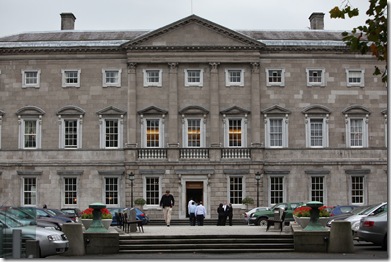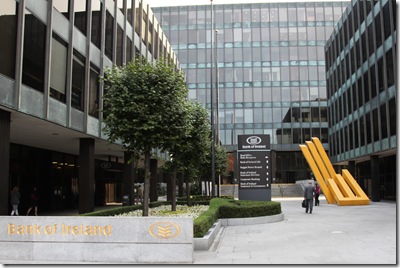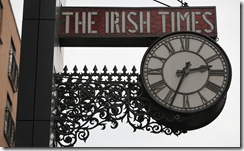 The Irish Nationwide Building Society presented a gung-ho image of its achievement, ambitions, prospects and the calibre of its chief executive, Michael Fingleton, even if the language used to express this was banal and repetitive.
The Irish Nationwide Building Society presented a gung-ho image of its achievement, ambitions, prospects and the calibre of its chief executive, Michael Fingleton, even if the language used to express this was banal and repetitive.
Massive Expansion in Lending
The increase in mortgage lending between 2003 and 2007 was 189%. This is why taxpayers are being stalked for €2.7 billion in bailout money. This is why such a high proportion of the assets of this decrepit building society are being dumped on the doorstep of NAMA. This is why the Irish Government want the citizens to be subdued, indifferent and ignorant. Ireland’s GDP grew by 36.6% from €139.4 billion in 2003 to €190.6 billion in 2007
Loan growth Bank of Ireland between 2003 and 2007 was 19%; by AIB was 37% and loan growth at Anglo Irish Bank was 37%.
The loan growth at the three Icelandic basket-case banks between 2003 and 2007 was – Kaupthing 72%, Glitner 54% and Landsbanki 57%.
At the benign end of the scale, the Swiss banks must have appeared to Fingleton to have been in a coma. Loan growth over this 5-year cycle at UBS was 9% and at Credit Suisse
Chicken’s come home to roost
Results for year ended 31 December 2009 reported a loss of €2.48 billion, a requirement for the Irish taxpayer to provide €2.7 billion in bailout funds, a declarations that assets with a book value of €8.7 billion will be sold to NAMA and that 96% of its loan impairment provisions relate to commercial loans.
The Chairman, Daniel Kitchen stated that the problems reported are a consequence of the nature of the operation of the business which was “clearly a flawed model” and that he was sanguine about Irish Nationwide’s capacity to ‘outperform’ (wow), in the short term. The new chief executive, Gerard McGinn, attributed the lousy performance to the “impact of the lending policies and practices of previous management”.
It is interesting to see how previous management reported their annual results from the time the credit bubble began to inflate on 1 January 2003.
2009 Results
Interest earned from loans was €529.4 million but €324 million of this has not is ‘unrealised’! Interest paid on customer savings accounts was down 42.3% to €420.8 million. If the ‘unrealised’ interest were never to materialise, the net interest income of Irish Nationwide in 2009 would be –€215.4 million.
A total of €4.793 billion in debt is due for repayment before 22 September 2010. How can this be accomplished?
Of the €1.189 billion owing to banks, €1.052.3 billion is repayable on demand and the balance in less than three months.
Impaired loans amount to €2.792 billion but only €105.8 million of this impairment relates to Irish residential lending.
“The final losses on the asset portfolio remain highly uncertain” until each and ever asset is resolved.
Demutualisation
While there were 23 building societies in existence when the State was founded that number shrunk to two after the passage of the Building Societies Act 1989 – EBS and Irish Nationwide. ICS Building Society was acquired by Bank of Ireland where it has operated within the Ireland Retail Division – and is about to be disposed of.
One of Fingleton’s principal goals was to demutualise ‘his’ building society
1994 Annual Report: “In order to enhance all the options open to the Society we
continue to seek a change in Section 102 of the Building Societies Act, 1989. On the
basis of the new structuring within the whole State banking and financial sector through the proposed disposal in whole or in part of the TSB Bank, ACC Bank, and
ICC Bank the restrictions of Section 102 are increasingly superfluous and irrelevant.
It is positively discriminatory against the Society, especially in that the Society must
now compete, without any privileges or advantages, with all other financial institutions to whom such a restriction does not apply. It is in the interests of our shareholders and our staff that this Section be amended to reflect the new realities of the market place.”
1998 Annual Report: “While mutuality is still a relevant concept even if the number of practitioners are reducing (there really are now only two, Irish Nationwide and the EBS) this as we have repeated often before should not be to the exclusion of other options and the Board of the Society has never presumed on behalf of its members to exclude any such option. Indeed that is why we have consistently sought to have Section 102 of the Building Societies Act, 1989 amended to enable the Society to have the same options that are available to other competing financial institutions. We hold no brief for mutuality as an exclusive option. If we were convinced that changing the corporate status of the Society was the correct option for the members and staff of Irish Nationwide we would have no hesitation in recommending this course of action.”
1999 Annual Report “Your Society gave a commitment to review our present and future status during the year in line with market forces and developments. This review was well advanced when we were forced to pause and to reconsider the position in the light of developments in the financial markets and particularly the serious downturn in the share values of the various financial institutions. Suffice to say that everything is on hold at the moment but we will continue to monitor the situation on an ongoing basis.
We have no brief for mutuality as an exclusive option. If we were convinced that changing
the corporate status of the Society was the correct option for the members and the staff of Irish Nationwide we would have no hesitation in recommending this course of action.”
Personal Remuneration
Michael Fingleton enjoyed personal remuneration from Irish Nationwide of €10 million and a personal pension fund in 2006 just shy of €29 million.
Fingleton’s Personal Remuneration
at Irish Nationwide Building Society
| 2003 | €910,000 |
| 2004 | €1,034,000 |
| 2005 | €1,269,000 |
| 2006 | €1,836,000 |
| 2007 | €2,313,000 |
| 2008 | €2,417,000 |
| 009 | €221,000 |
| TOTAL | €10,000,000 |
Directors’ Report 2003: “The excellent results we now report are the strongest yet in the Society’s long history of growth and achievement and significantly enhance shareholder value.
The Society has a strong and effective management team headed by a strong and focused chief executive (Fingleton) whose experience and expertise has produced exceptional results year after year
The Society has improved its cost income ration to a new record low of 21.43%
The Society’s plans for demutualisation have made further progress during the year (2003) and the Government agreed, at the Society’s request, to bring in appropriate legislation to enable the Society achieve a solution which would reduce the uncertainty of future ownership and greatly enhance shareholder value and give the Society the options required to do so”
Directors’ Report 2004
“The excellent set of results we now present clearly reflects the effectiveness of the Society’s strategy that has been successfully implemented and developed over many years.
The success of the Society is reflected in its strong chief executive, its excellent staff, its highly qualified and experienced Board of Directors.
The Board of the Society is fully committed to demutualisation. The Minister for the Environment, Heritage & Local Government (Martin Cullen) issued a full statement on behalf of the Government on 16 December 2003 announcing the Government approval of a package of measures to amend the current Building Societies legislation, including the removal of the five-year barrier under Section 102. The proposed legislation is extensive and contains several provisions to enhance the future development of building societies as independent institutions as well as removing archaic unnecessary procedures.
On 15 September 2004 the Minister, Martin Cullen, wrote to the Society stating “my Department is at present involved in the drafting process with a view to finalisation of the legislation in the Autumn (of 2004)”. The Board of the Society,of course, welcomes those announcements and statements but is disappointed that the proposed legislation will not materialise until later in 2005.
The demutualisation process must be managed in a prudent, professional and orderly manner in order to maximise the value for the management, staff and (lastly) members.
The cost income ratio was further reduced during the year from 21.43% to a new record low of 20.24%.”
Directors’ Report 2005
“The record results we now report are the strongest yet in the Society’s long history of outstanding growth and achievement. The excellent set of results reflects the effectiveness of the strategy that has been successfully developed and implemented over many years.
The long awaited legislation is now being drafted and we understand will be published shortly and finally approved before the Summer recess (of 2006).
In the year under review, the Society further improved its cost income ratio to a new record low of 15.18%.
Under the strong leadership of the Managing Director together with a committed and supportive staff, backed by an informed and unified Board, the underlying value of the Society has increased six-fold in the past ten years”
Directors’ Report 2006
“The record results are by far the strongest since the formation of the Society in 1873.
The results demonstrate once again the exceptional financial strength of Irish Nationwide and clearly reflect its strong management together with the effectiveness of its lending strategy developed and successfully implemented over the years. The Society has developed a successful business model and continues to be focused on our chosen market.
In a year which may well be the last reporting year as a building society, it is appropriate that the Society should present such an outstanding set of results.
Despite relentless opposition from some of our members’ and other vested interests’, the long awaited legislation formally became law in August 2006. The Board decided to await the publication of the 2006 audited accounts before formally going to the market. The value of the Society has been enhanced and the net book worth of the Society is up 27% to over €1.2 billion”.
Directors’ Report 2007
“The Board will continue to seek a purchaser for the Society at an acceptable price and will consider all the options open to it to achieve the objective and to realise the optimum value for its members and staff.
The exemplary results we are privileged to report are by far the strongest yet in the Society’s long history of growth and achievement and significantly increase shareholders value with the Society’s net book worth now in excess of €1.5 billion.
The cost income ratio is now at a record low of 10% having fallen from 14.44% in 2006”
Directors Report 2008
“ … was a disappointing year for the Society due to the disruption in global financial systems, the onset of the recession in Ireland and the UK and the resultant downturn in property values.
Cost control has always been and continues to be a major objective of the Society’s policy. The 2008 cost income ratio is 17% due to reduced income in 2008 rather than cost increases.
The Board wishes to thank Mr Fingleton for the enormous and unique contribution he has made to the Society over the past 37 years and wishes both Michael and his wife, Eileen, many happy years of retirement”
Directors’ Report 2009
“It is with great disappointment that I have to present to you the accounts for the year ended 31 December 2009 which reflect unprecedented levels of impairment on our loan book which gave rise to losses on a massive scale in the context of the Society. The collapse of property markets in Ireland and abroad gave rise to the impairments but this was exacerbated by the nature of the operation of the business which was clearly a flawed model. Final losses on the asset portfolio remain highly uncertain. The financial results reflect the impact of the lending policies and practices of the previous management. The scale of losses reflect the failure of the Society’s commercial lending strategy which was over reliant on asset values. 96% of the loan impairment provisions relate to commercial loans.
The Group’s customer accounts decreased by €1.5 billion in 2009 as a result of deposit outflows from the Group’s Isle of Man subsidiary and reflects concerns held by UK investors about deposit security despite the Irish sovereign guarantee. 2010 remains highly uncertain in the context of an industry seeking to define its future structure.”
Mortgage Lending and Mortgage Funding
| Total Mortgages € | Commercial Mortgages % Total | Customer Accounts (€ Savings) | |
| 2003 | 4,248,000 | 3,465,000 | |
| 2004 | 5,553,000 | 35% | 4,755,500 |
| 2005 | 7,572,000 | 32% | 5,733,500 |
| 2006 | 10,306,000 | 76% | 6,602,700 |
| 2007 | 12,281,000 | 80% | 7,250,100 |
| 2008 | 10,473,900 | 78% | 6,785,000 |













